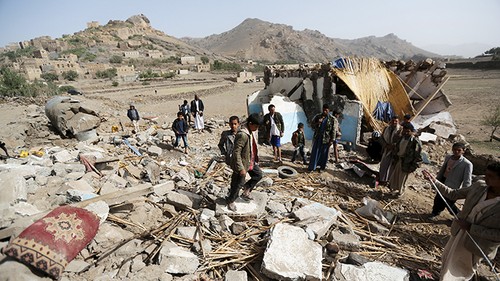(VOVworld) – Yemen’s civil war has become a central issue in the Arab world since Saudi Arabia and its allies made a direct military intervention into Yemen. The worsening situation in Yemen is threatening regional security.
Air strikes by the Saudi-led coalition targeting Houthi rebels in southern Yemen have entered their 14th day. Several countries have evacuated their citizens from Yemen. Since the beginning of the operation more than 500 people have been killed and 1000 injured.

People gather around the wreckage of a house destroyed by an air strike in the Bait Rejal village, west of Yemen's capital Sanaa April 7, 2015.
(Reuters / Khaled Abdullah) |
No limit for the sectarian conflict
Tension in Yemen has escalated since Houthi rebels occupied Sanaa city last September. The conflict became a civil war when Houthi rebels expanded their operation southward to Aden city, where President Abd-Rabbu Masour Hadi had sought a safe haven. The Saudi-led coalition conducted large-scale air-strikes in Yemen to protect the government of President Hadi. The military intervention has provoked fears of an all-out war between Sunni and Shi’ite denominations of Islam.
Confrontations between Shi’ite and Sunni Islam has occurred throughout Islamic history, not just in Yemen. After War World II, new borders were established that often ignored racial and religious groupings. Israel, a state of Jewish people from around the world backed by the US and the EU, was formed in the middle of hundreds of millions of Arab people. This has been the root of continuous division and conflict. Inside the Arab world, the Sunni majority and the Shi’ite minority have confronted each other for decades. A majority of Shi’ite followers live in Iran, where regional conflicts have often originated. Yemen’s civil war is, in fact, a confrontation between Iran and Arab countries led by Saudi Arabia and backed by the US.
A war to expand influence
The Saudi-led air strikes in Yemen are ostensibly a mission to protect the government of President Mansour Hadi, but behind them are the political and economic interests of Yemen’s neighbors.
In Syria, President Al-Assad has strengthened his government. Iraq, with support from Iran and local militias, has forced the Islamic State to retreat. Iran has revealed its ambition to expand its influence in the region. An agreement with P5+1 on its nuclear program has helped Iran improve its position. The Houthi rebels’ sudden occupation of Sanaa was a victory for Iran, Hezbollah, and Syria who have long been considered an axis of evil by the US and the West. Saudi Arabia cannot stand idly by and watch Iran extend its influence in Yemen.
Another thing worrying Saudi Arabia and the US is Yemen’s critical location. Oil tankers from UAE, Kuwait, and Iraq headed to the EU have to pass Yemen’s Aden port before entering the Red Sea to the Suez canal. If Yemen’s government collapses and is replaced by a Shi’ite government, the US will have to rethink its foreign policy.
The US doesn’t want to jeopardize its relations with Iran right now because it needs Iran’s support in combating IS. The US will have to limit any intervention in Yemen to help its Sunni allies.
Given the tangle of interests and differences of all the countries involved, it seems likely that the Yemeni civil war will become a new front on which world powers will contend for influence.